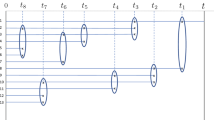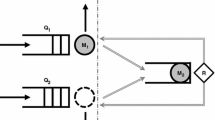Abstract
Queueing with correlated arrivals occurs when customers arrive at a set of queues simultaneously. The difficulty in analyzing systems with correlated arrivals is due to the fact that the individual queueing systems are stochastically dependent. Exact methods for analyzing these systems are computationally intensive and are limited to only a few special cases. In this paper, we consider a system of parallel queues with bulk service and correlated arrivals. We show how the matrix-geometric approach can be used to obtain the performance measures of the system. We also develop an algorithm for large systems that efficiently approximates the performance measures by decomposing it into individual queueing systems. Finally, we describe how the principles of our decomposition algorithm can be extended to analyze a variety of different parallel queueing systems with correlated arrivals. We then evaluate the accuracy of our algorithm through a numerical study.
Similar content being viewed by others
References
M. Altman, Writing a discrete event simulation (2000), http://www.nmsr.labmed.umn. edu/~michael/des.html.
M. Burman, S.B. Gershwin and C. Suyematsu, Hewlett-Packard uses operations research to improve the design of a printer production line, Interfaces 28 (1998) 24–36.
J.A. Buzacott and J.G. Shanthikumar, Stochastic Models of Manufacturing Systems (Prentice Hall College Division, 1993).
F. Cheng, M. Ettl, G. Lin and D.D. Yao, Inventory-service optimization in configure-to-order systems, Manufacturing and Service Operations 4 (2002) 114–132.
K.L. Cheung and W. Hausman, Multiple failures in a multi-item spare inventory model, IIE Transactions 27 (1995) 171–180.
S. Dayanik, J. Song and S. Xu, The effectiveness of several performance bounds for capacitated assemble-to-order systems, Manufacturing and Service Operations Management 5 (2003) 230–251.
Y. Gerchak and M. Henig, Component commonality in assemble-to-order systems: Models and properties, Naval Research Logistics 3 (1989) 61–68.
P. Glasserman and Y. Wang, Lead-time-inventory trade offs in assemble-to-order systems, Operations Research 46 (1998) 858–871.
D. Gross and C.M. Harris, Queuing Systems, 3rd edn. (Wiley-Interscience, 1998).
W. Hausman, W.H. Lee and A. Zhang, Joint demand fulfillment probability in a multi-item inventory system with independent order-up-to policies, European Journal of Operations Research 109 (1998) 646–659.
S. Iravani, K.L. Luangkesorn and D. Simchi-Levi, On assemble-to-order systems with flexible customers, IIE Transactions 35 (2002) 389–403.
S.M.R. Iravani, L. Luangkesorn and D. Simchi-Levi, A general decomposition algorithm for parallel queues with correlated arrivals, Department of Industrial Engineering and Management Sciences, Northwestern University, Evanston, IL (2003).
V.G. Kulkarni, Modeling and Analysis of Stochastic Systems (Chapman Hall, London, 1995).
J. Medhi, Stochastic Models in Queueing Theory (Academic Press, 1991).
D. Simchi-Levi, E. Simchi-Levi and P. Kaminsky, Designing and Managing the Supply Chain (McGraw-Hill, 2000).
J.S. Song, On the order fill rate in a multi-item, base-stock inventory system, Operations Research 46 (1998) 831–845.
J.S. Song, S. Xu and B. Liu, Order-fulfillment performance measure in an assemble-to-order system with stochastic lead-times, Operations Research 47 (1999) 131–149.
J.S. Song and D.D. Yao, Performance analysis and optimization of assemble-to-order systems with random lead-times, Working Paper, Columbia University, New York (2000).
R. Srinivasan, R. Jayaraman, R. Roundy and S. Tayur, Procurement of common components in a stochastic environment, Research Report, IBM Watson Research Center, Yorktown Heights, NY (1992).
J.M. Swaminathan and S.R. Tayur, Managing broader product lines through delayed differentiation using vanilla boxes, Management Science 44 (1998) S161–S172.
U. Wemmerlov, Assemble-to-order manufacturing, implication for material planning, Journal of Operations Management 4 (1984) 347–368.
S.H. Xu, Structural analysis of a queuing system with multiclasses of correlated arrivals and blocking, Operations Research 47 (1999) 264–276.
S.H. Xu, Dependence analysis of assemble-to-order systems, in: Supply Chain Structures: Coordination, Information and Optimization, eds. J.S. Song and D.D. Yao (Kluwer Academic, Boston, 2001).
S.H. Xu and H. Li, Majorization of weighted trees: a new tool to study correlated stochastic systems, Mathematics of Operations Research 25 (2000) 298–323.
R.Q. Zhang, Expected time delay in multi-item inventory systems with correlated demands, Naval Research Logistics 46 (1999) 671–688.
Author information
Authors and Affiliations
Rights and permissions
About this article
Cite this article
Iravani, S., Luangkesorn, K. & Simchi-Levi, D. A General Decomposition Algorithm for Parallel Queues with Correlated Arrivals. Queueing Systems 47, 313–344 (2004). https://doi.org/10.1023/B:QUES.0000036395.55351.07
Issue Date:
DOI: https://doi.org/10.1023/B:QUES.0000036395.55351.07




